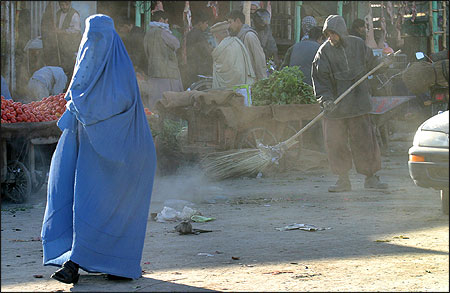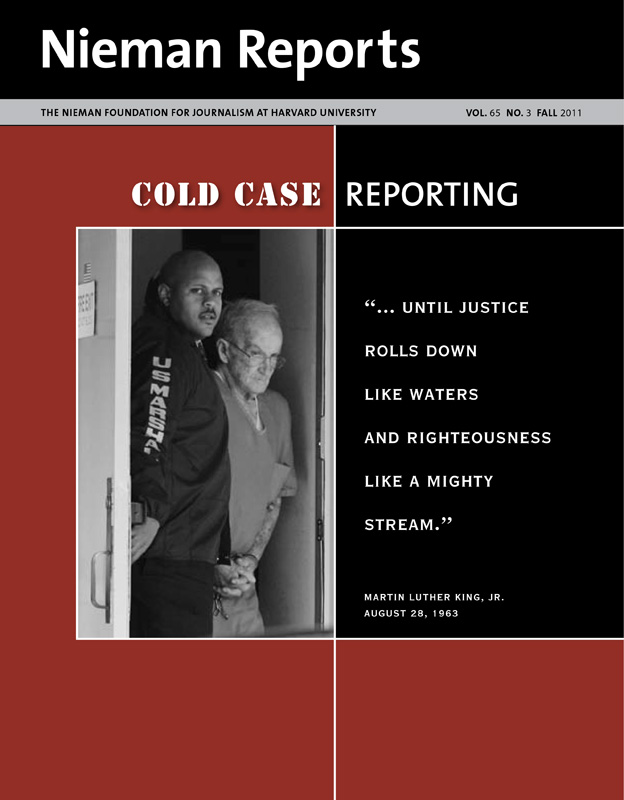
The burqa is a defining element of women’s lives in Afghanistan. Photo by Richard Vogel/The Associated Press.
When Kim Barker describes a burqa as a "giant blue badminton shuttlecock," it's apparent that she isn't out to please the sensitive or easily annoyed. Yet the reality she reveals in her memoir "The Taliban Shuffle" and the satire and perception she voices make her words a gift for those eager to understand how bizarre the time spent in Afghanistan and Pakistan can be for journalists as we operate inside and outside of the high-security walled bubbles.
Barker's book encompasses her five years as the Chicago Tribune's South Asia bureau chief, a job she was dispatched to in 2004 despite little prior overseas experience. The tenor of her journey veers—as her reporting life did—from serious to crazed, as she lurches through an adrenaline-fueled correspondent's life, its rhythm dictated by breaking news of assassinated politicians and suicide bombings that allow few breaks to just breathe.
"The Taliban Shuffle," playful even in the title she chose, is not a dense geopolitical work. But this is not to say that pertinent insight is absent; Barker just offers it in a more folksy way, such as when she refers to the Taliban and its "insurgent rainbow alliance." Or when she tells us the Taliban's hatred of the coalition troops and Afghan government "probably overrode their own Hatfield-and-McCoy disputes." In recounting the complexities of tribal life in Afghanistan's southern Kandahar province, where people can feel stuck between the government's grasp and the Taliban's tug, she paints the scene this way: "Only four men attended a funeral for a pro-government cleric near Kandahar—and two were gravediggers." Her acuity tends to make such scenes stick.
Mostly Barker's narrative weaves us through the cross section of people she meets along the way—from Afghan and Pakistani powerbrokers in presidential offices to street vendors, soap opera actors, and soldiers. She incisively peers inside, at one point calling the country's government as "effective as a student council." When she finally gave up her room in Kabul, a bedroom still occupied by boxes left behind by previous expats, she sees Afghanistan as a place with foreigners unable to commit to leaving the country "but unable to figure out how to stay." Barker's willingness to say without equivocation what her eyes and ears tell her is part of the book's intrigue.
The international community, which is part of the "two-tiered society—one for Afghans, and one for Westerners," doesn't escape her comment. She takes us inside the fortified compounds where the diplomats largely remain ensconced as she questions whether the billions being spent in wartime funding are making any significant difference, especially given that the money tends to end up in pockets where it was not intended to land. "Afghanistan was not just a money pit," she writes. "It was a money tar pit, a country where money stuck to walls and fingers and never to where it was supposed to stick."
Then there are the communities of foreigners in Kabul, including soldiers-turned-security contractors and employees of nongovernmental organizations as well as journalists.
To be a reporter in Kabul, Barker writes, is often to be led inside "whether in a house or a car or a burqa," if only because to be outside too often courts danger. In the three months I spent this year as a freelance journalist in Afghanistan, reporters' movements were consistently curtailed by security threats that existed throughout the country. The dangers have increased dramatically, to the point that, in their off-time, many reporters I met only ventured from one private home to another or to meet up for a glass of bad, expensive wine at poorly lit, expat-only Thai or Italian restaurants. From Barker's years there (she returned to the United States in 2009), she tells of journalists gathering at toga parties and about a bash featuring camels. Having such nighttime release seems a relic from a different time, even if its rationale still holds. As Barker takes us to these blowout events, she labels them quite rightly as being a "symptom of the absurdity" of the war.
"I was hardly better than the rest," she says, as she enrolled in "Kabul High," where a diversionary tactic involved singing karaoke and drinking Heinekens at The Delicious Barbeque, a brothel. She describes herself as a "drowning caricature of a war hack." Eventually, with her own life and loves having been shoved for too long behind the immersive obligations of her job, with her apartment "essentially a layover," she steps away from her correspondent's life for New York.
AUTHOR'S NOTE
In the relatively small circle of Afghan fixers, it not surprising that I also came to know Samim and wrote a story for The Chronicle of Higher Education about his pursuit of a master’s degree in organizational communication at the University of Ottawa. A PDF of the story is available » Throughout her story, Farouq Samim, a medical doctor turned fixer (shorthand for a journalist's guide and translator) is a central character. He becomes her lifeline. As happens in tight relationships built on mutual dependence, at times he and Barker clash. "He most likely resented that he had to work, when he'd rather be with his family, and when I was out behaving like a teenager," she writes. In the end, despite their cultural chasms, they have developed a close and enduring friendship.
Being a Woman Reporter
The obvious intersection of my experience and Barker's book is that each of us went to Afghanistan as a woman with a mission to report. I met Barker in New York, shortly before I left for Afghanistan. We became quick friends, connecting over our years spent reporting abroad (I was in Mexico)RELATED ARTICLE
“An Odd Couple: Journalists and Academics”
- Monica Campbell
From Fall 2010 and the transition back to the United States. Yet as I read about her life in Afghanistan, especially, I discovered similarities between her experiences and mine. Her words drew me in. It's true, as she observes, that being female can be an advantage in Afghanistan, in part because Western women are still curiosities there, especially outside Kabul. As Barker puts it, we are "the third sex, immune to the local rules for women." This means we can interview women in places off-limits to most men—in kitchens and bedrooms or other rooms inside a house; these are places where emotions and personal views will often emerge, enriching our reporting. At the same time, as reporters, we go to meetings of U.S. marines and local Afghan militia members and sit-downs with mullahs, giving us a dual perspective, both intimate and official.
As Western women, there were times when we confront the bothersome daily realities that Afghan women face. At checkpoints and in shopping malls, government buildings and airports, women are directed to curtained-off rooms to get patted down by other women. "Walk inside some dark room with several women drinking tea. Assume the position—arms out to the sides, legs spread. … Often a security check consisted of a breast squeeze, a crotch grab, and a slap on the back," Barker writes. Pat-downs can seem like some odd variation of a teenage feel-up.
Part of our Afghanistan "shuffle" is to roll with things that would make most Western women burst. Barker's ability to capture her own constant flux between fascination and frustration made me recall the time I was stuck in a cramped Toyota on a sweltering afternoon along a mountainous Afghan highway. A NATO military convoy had jammed traffic for hours. With a long wait ahead, men wearing breezy shalwar kameezes stepped out from their cars to sit on the road's stone ledge and take in breathtaking views of mountains and cliffs. Some ventured down to the river.
As a woman, there'd be no leaving the car. "Wouldn't be normal," my Afghan friend strongly advised. "Do you see any other women getting out of the car?" he asked. And then answered his own question: "No, because it's not normal. Here, women stay put."
And so I did, along with my friend's two sisters. Cloaked in black layers, boxed in by overstuffed tractor-trailers, we acceded to the way things are despite our discomfort.
Barker writes about the "oddly liberating" temptation that a lot of female reporters have of just throwing on a burqa with its mesh eye-screen and observing people, whether they be turbaned elders or young militia, freely from the street without them staring back. I had that same feeling a few times when I was there, but resisted doing so. Still, it was strange to think that there are those circumstances when it's easier to just be invisible.
Monica Campbell, a 2010 Nieman Fellow, is a San Francisco-based freelance journalist. In Afghanistan, she participated in Basetrack.org a Web-based reporting project that involved a one-month embed with the U.S. Marines. She also reported for Public Radio International's "The World" and collaborated with the International Committee of the Red Cross on a series of articles about health care in Afghanistan.




